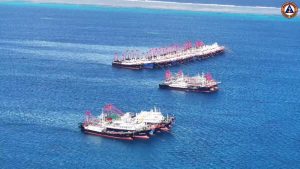The Philippine defense minister has reprimanded China for blaming his country for the recent tensions in the South China Sea, saying that Beijing is globally isolated on the issue.
Defense Secretary Gilberto Teodoro’s comments followed an incident in which Chinese vessels collided with a Philippine supply boat and coast guard ship in two separate incidents on the weekend of December 9-10 – incidents that a Chinese government spokesperson later said were “entirely caused” by the Philippines.
“My response to that is that only China believes in what they are saying. In truth and in fact, no country in the world – none – supports unequivocally their claim to the whole of the South China Sea,” Teodoro told reporters, according to the Philippine broadcaster ABS-CBN.
Speaking on the sidelines of a ceremony for the handover of a Japanese-made air surveillance radar system to the Philippine Air Force in San Fernando City, he added that many countries supported the Philippines’ rights over its exclusive economic zone (EEZ) and “other areas where we have territorial jurisdiction.”
“No country in the world, to this time, has condemned the Philippines in what it is doing,” Teodoro said. “That is the best proof to what I said.”
Teodoro’s comments were the latest in a blur of recriminations that have flown between Beijing and Manila during the past year, as China has intensified its efforts to assert and defend its expansive “nine-dash line,” which lays claim to nearly the entire South China Sea, cutting deeply into the EEZs of the Philippines, Vietnam, Malaysia, and Brunei.
Much of China’s attention has focused on areas claimed by the Philippines, a U.S. ally that has strengthened its security ties with Washington under President Ferdinand Marcos Jr. In particular, it has focused its Chinese attention on Second Thomas Shoal, a submerged feature that the Philippines occupies in the Spratly Islands.
Since the middle of 2023, China has established what amounts to a loose blockade of shoal, making increasingly dangerous attempts to prevent Philippine forces from resupplying the small detachment of troops stationed aboard the BRP Sierra Madre, a rusting warship that was purposefully grounded on the shoal in 1999.
In the most recent incident, China Coast Guard and Chinese maritime militia ships “harassed, blocked, and executed dangerous maneuvers on Philippine civilian supply vessels,” the Philippine Coast Guard (PCG) claimed. The CCG rammed one supply ship and fired high-pressured water cannons at a second, “disabling the vessel and seriously endangering the lives of its crew,” the PCG alleged.
On Tuesday, Chinese Foreign Ministry spokesperson Wang Wenbin said that this clash, and another incident involving water cannons near Scarborough Shoal, were “entirely caused by deliberate infringement and provocation by the Philippines.” The message was underlined by Foreign Minister Wang Yi yesterday in a call to Foreign Affairs Secretary Enrique Manalo. Wang referenced the “Serious difficulties” in the South China Sea and warned that if Manila misjudges or colludes with “ill-intentioned” external forces (read: the United States) in contested waters, China would defend its rights and respond resolutely, Reuters reported, citing a statement from China’s Foreign Ministry. “China-Philippines relations are at a crossroads,” the statement cited Wang as saying. “The top priority is to properly handle and control the current maritime situation.”
It is undeniable that China is outnumbered in terms of global public opinion when it comes to the South China Sea disputes. Indeed, this has been a key element of Manila’s current strategy of publicizing aggressive Chinese actions in contested waters, and the latest incident prompted supportive statements from the U.S. and other close partners.
At the same time, it is unclear how much weight global public opinion will hold in the face of China’s overwhelming superiority of force. According to its “gray zone” strategy, Beijing has clearly calculated that the U.S. and other partners of the Philippines will stop short of actively intervening in the conflict for fear of provoking a wider conflict. This has considerably raised the stakes in contested waters, and raised the possibility that a miscalculation by any of the major players could set off a wider regional conflict.

































